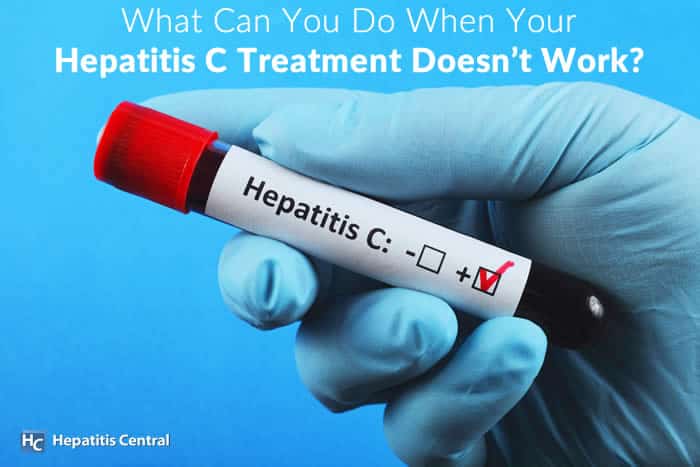What Can You Do When Your Hepatitis C Treatment Doesn’t Work?


The hepatitis C virus can be treated with medication. And a majority of the time, these medicines work. (1) But what happens if you’re one of the minority whose treatment doesn’t work?
First, it’s helpful to understand some of the most common reasons behind hepatitis C treatment failure. This helps you set realistic expectations.
There are also steps you can take if your hep C treatment protocol isn’t working, along with a few things you can do to help manage your condition in the meantime.
Let’s get into each of these now.
Causes of Hepatitis C Treatment Failure
According to a 2020 study involving 1,253 people with the hepatitis C virus, direct-acting antiviral therapy works in more than 95% of the cases. (2) However, for those in the other 5%, several factors appear to contribute to treatment failure.
After assessing 20 different variables, researchers noted that the three strongest predictors of hepatitis C treatment being unlikely to work were:
- Being an older age. Researchers theorized that this could be due to older patients having adverse treatment effects more often, causing them to discontinue treatment. They also suggested that this could be a result of older people having more severe cases of hepatitis C, whether due to having the infection longer or age-related issues that affected their ability to recover.
- Having a history of hepatocellular carcinoma. Researchers in this study couldn’t say why a history of this disease was associated with a higher risk of hepatitis C treatment failure. But other studies suggest that having both conditions create a complex situation with several treatment-based considerations. For example, those related to treatment timing, treatment interaction, and how one disease affects the other. (3)
- Insurance status. Sadly, a person’s insurance status also predicted whether treatment would be ineffective, particularly if the patient was denied treatment. Being denied treatment results in a higher risk of developing a more severe case of hepatitis C or the development of more complications. Researchers further noted that denial was more common with government insurance than private insurance. So a person having private insurance is a strong predictor of hepatitis C treatment success.
Other factors commonly associated with hep C treatment failure (according to this research) included:
- being co-infected with HIV
- current use of opioid substitution therapy
- hepatitis C treatment history
- organ transplantation
- having cirrhosis
- and alcohol use history.
Setting Realistic Hep C Treatment Expectations
While medications work for a majority of hepatitis C patients, they aren’t effective for everyone. Understanding this upfront can help you set realistic expectations when engaging in your recommended course of treatment.
The National Institute of Diabetes and Digestive and Kidney Diseases reports that hepatitis C medications are generally taken for 8-24 weeks to cure this disease. (4) Additionally, the length of treatment can vary based on a variety of factors, some of which include your specific hep C genotype, the extent of liver damage, and whether you’ve had this condition before.
Your healthcare provider can do blood tests to see if your course of treatment is working.
What if they determine that it isn’t?
Steps You Can Take If Your Hepatitis C Treatment Isn’t Working
The first thing you can do if your treatment isn’t effective is to consider whether you followed the protocol as recommended. If you quit taking your medication before it was done, it may not have cured the infection.
It’s also possible that the medicine cured the virus only for it to return (referred to as relapse). Or the virus may be resistant to the medication that was prescribed.
In all of these cases, it’s important to discuss your situation with your healthcare provider. Together, you may be able to identify the issues that prevented treatment success.

It’s also possible that your medication may need to be switched or the dosage changed. Depending on the reason behind the treatment not working, this may be enough to help you finally get rid of the hepatitis C virus.
Ways to Help Manage Your Hepatitis C
There are also a few actions you can take to better manage your hepatitis C until it can be fully treated. The American Liver Foundation (ALF) shares that this includes: (5)
- Adhering to your treatment plan as recommended
- Showing up to all your medical appointments and doing all of the required lab tests
- Following a healthy, well-balanced diet
- Reducing your alcohol intake, if not eliminating it completely
- Getting regular exercise
- Managing your stress levels
The ALF also recommends speaking with your healthcare provider before taking any type of vitamin or supplement as some nutrients can be harmful to the liver.
Choosing a supplement designed to promote liver health can also help avoid these issues, such as UltraThistle or Clinical LiverSupport.
(1) National Library of Medicine. (2022, March 22). Hepatitis C. Retrieved April 23, 2022, from https://medlineplus.gov/hepatitisc.html
(2) Nabulsi, N., Martin, M., Sharp, L., et al. (2020, November 13). Predicting Treatment Failure for Initiators of Hepatitis C Virus Treatment in the Era of Direct-Acting Antiviral Therapy. Frontiers in Pharmacology. doi:10.3389/fphar.2020.551500
(3) Harrod, E., Moctezuma-Velazquez, C., Gurakar, A., et al. (2019, July 29). Management of Concomitant Hepatocellular Carcinoma and Chronic Hepatitis C: A Review. Hepatoma Research. doi:10.20517/2394-5079.2019.15
(4) National Institute of Diabetes and Digestive and Kidney Diseases. (2020, March). Hepatitis C. Retrieved April 23, 2022, from https://www.niddk.nih.gov/health-information/liver-disease/viral-hepatitis/hepatitis-c
(5) American Liver Foundation. (2022, April 19). Treating Hepatitis C. Retrieved April 23, 2022, from https://liverfoundation.org/for-patients/about-the-liver/diseases-of-the-liver/hepatitis-c/treating-hepatitis-c/#what-you-need-to-know-while-on-treatment







